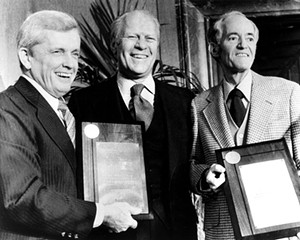
Longtime central Illinois congressman Paul Findley died in Jacksonville on Aug . 9, 2019. He was 98.
As a young man, Paul Findley was a typical moderate Republican of the sort that mid-Illinois once produced like corn. A small-town boy born and bred in farm country, he was a Main Street Republican businessman who was imbued with that species' innate distrust of "socialism," meaning any government program the Republicans didn't vote for. In nearly seven decades of public life, he grew into something better.
Born in Jacksonville, Findley graduated Phi Beta Kappa from Illinois College in 1943. He had been a journalist in Jacksonville and later in Washington, and after a stint in the World War II Navy he returned to Illinois, where he bought and ran The Pike Press, Pittsfield's weekly. The novelty of voters electing a newspaperman to high public office was not noted in his many obituaries.
Always public-minded, Findley ran for Congress and was elected in 1960. In Washington he tended to central Illinois issues (subsidies to farmers, mainly) for the folks back home, and for the nation tended mainly to foreign policy. Findley never resorted to the reflexive isolation of, say, his Downstate GOP colleagues like Les Arends. Findley was the first Republican congressman to advocate for normal relations with the People's Republic of China, was strong on NATO and was an informed backer of foreign aid. He recognized the folly of Vietnam and attempted to constrain the ability of presidents to commit future Vietnams by authoring the legislation commonly known as the War Powers Act. That requires presidents to get the approval of the people's representatives before sending American troops into combat. That this requirement that been disregarded as inconvenient by every president since then does not reflect on its wisdom.
Findley was moderate in the best sense, being not wishy-washy but measured in his response to events. "When I got into office — and despite my votes — the country's direction changed," he wryly explained to interviewer Mark DePue in 2013. "I thought the only sensible thing for me to do was to adjust to reality and, where I could, redirect the new direction, but not to try to kill it." He backed civil rights and appointed Frank Mitchell of Springfield to be the first African-American page in the House of Representatives.
Findley ran for a 12th term in 1982 against Springfield Democrat Dick Durbin. (IT's publisher backed him in that race, and not merely out of publishers' solidarity.) Foreign affairs did not matter particularly prominently to the voters of the district in those days unless it involved soybean purchases, but it mattered decisively to some fund-raisers outside the district. Findley had dared to urge that the U.S. treat with the Palestinian Liberation Organization over the Israeli occupation of Palestinian territory. Zealots among Israel's supporters pronounced political fatwah on Findley. It was estimated that 90% of Durbin's campaign donations came from pro-Israel donors such as AIPAC, the American Israel Public Affairs Committee.
The ensuing campaign was, let us say, unpleasant. Findley was variously pitied as naive and damned as anti-Semitic. (He was neither.) So fevered are some pro-Israelis about Findley's presumption that they kicked him even after he was dead; the obituary that ran in Commentary sneeringly referred to him as "the seeming gentleman from Illinois."
How much the PLO issue affected the vote that year is unclear — the bad smell of Nixon, and Ford's pardon of Nixon, clung to Findley as it did all Republicans — but the pro-Israel money helped Durbin win, barely, and Findley never ran again. (Findley, a liberal sort of conservative, and Durbin a conservative sort of liberal, later became friends.)
Findley was a scholar of sorts, with a particular respect for Lincoln. He was the second congressman (with Paul Simon) to have a go at explaining the effect on Lincoln's views of his term in the U.S. House. (See A. Lincoln, the Crucible of Congress (Crown, 1979.) Findley also was conspicuous during the campaign to hand over Lincoln's home to the National Park Service.
Findley chose not to stay in D.C. and get rich as a lobbyist but eventually came back home to Jacksonville, where he wrote books and lectured. One of those books was 1985's They Dare to Speak Out, in which he recalled the fates of other public officials who had taken on the Israel lobby and lost.
Findley told his own story in Paul Findley, Speaking Out (Lawrence Hill Books, 2011). Those curious to know more should also consult the interesting and informative interview he did by Mark DePue in 2012 for the Abraham Lincoln Presidential Library and Museum. (See Interview with Paul Findley # IS-A-L-2013-002.) See also our interview with him in "Our darkest time," Illinois Times, July 31, 2003.
James Krohe Jr. is an Illinois Times veteran and author of the award-winning history of mid-Illinois, Corn Kings & One-Horse Thieves (SIU Press, 2017). His writing on Illinois may be found on The Corn Latitudes.

